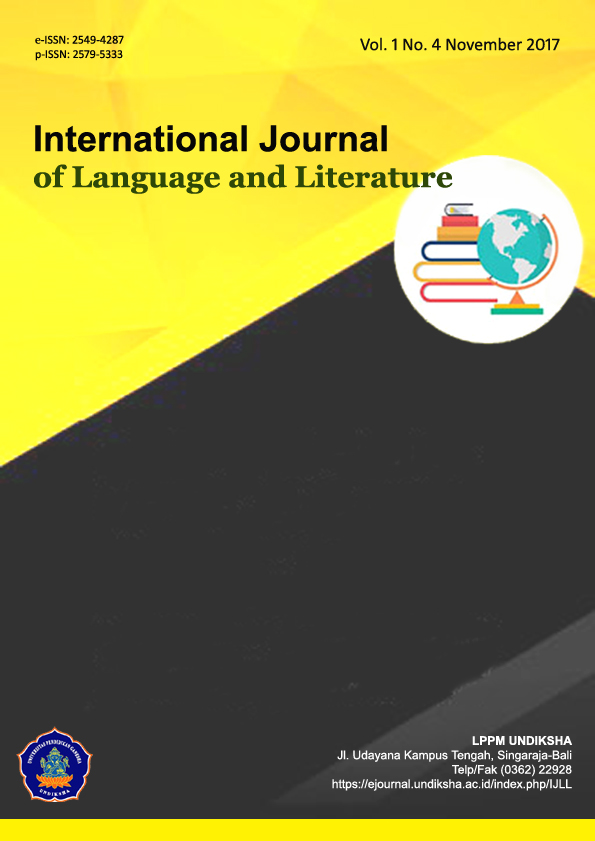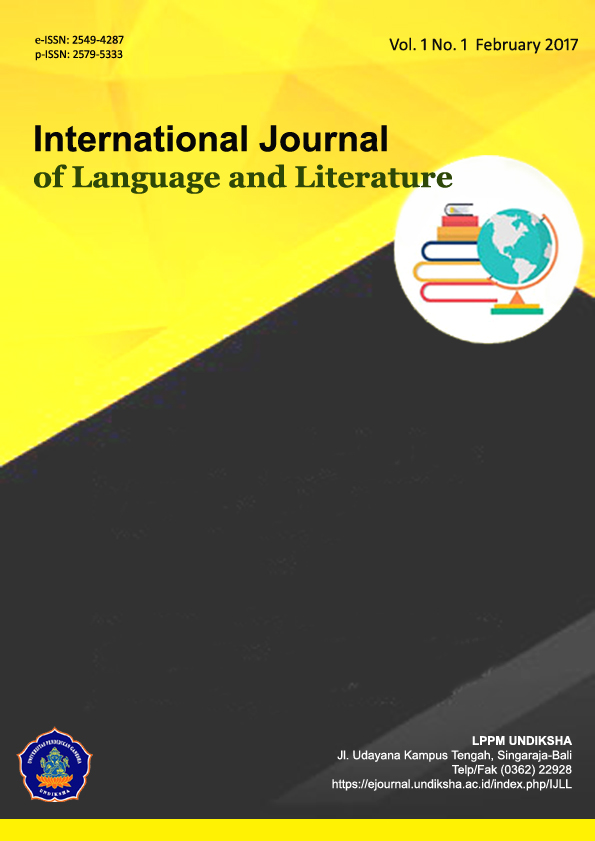THE EFFECT OF COLLABORATIVE ASSESSMENT AND LEARNING STYLE ON STUDENTS’ WRITING COMPETENCY
DOI:
https://doi.org/10.23887/ijll.v1i4.12582Kata Kunci:
collaborative assessment, learning style, students’ writing competencyAbstrak
This experiment study aims at investigating the effect of collaborative assessment and learning style on students’ writing competency of eleventh grade students of SMAN 1 Kuta. To conduct this research, 92 students were selected as the sample. The design of this research was 2x2 factorial design. Data of writing competency were collected by an instrument called posttest which is essay type test, meanwhile learning style data were collected by questionnaire. The acquired data were analyzed statistically by two way ANOVA and Tukey test. This research discovers: 1) there is a significant effect of collaborative assessment on students’ writing competency, 2) there is a significant interaction effect of assessment type (collaborative and conventional assessments) and learning style (field dependent and independent) on students’ writing competency, 3) collaborative assessment affects significantly on field dependent students’ writing competency, and 4) collaborative assessment does not affect significantly on field independent students’ writing competency.
Referensi
Badan Standar Nasional Pendidikan. 2005. Standar Kompetensi dan Kompetensi Dasar Bahasa Inggris SMA/MA. Jakarta: BSNP
Black, et.al.2005. Assessment for Learning: Putting into Practice. New York: Open University Press
Borich, Gary D.2007. Effective Teaching Methods.New Jersey: Pearson Prentice Hall.
Campbell, V. and Johnstone, M. 2010. The significance of earning style with respect oachievement in first year programming students.pdf (accessed on October 12 2012)
Chan C.2010. Assessment: Self and Peer Assessment, Assessment Resources@HKU, University of Hong Kong . Retrieved on 14 April 2014 at http://ar.cetl.hku.hk
Duncan, N. 2007. “Feed-forward‟: improving Students Use of Tutor Comments, Assessment & Evaluation in Higher Education. 32 (3), 271-283.
Falchikov, Nancy. 2003. Involving students in assessment. Psychology Learning and Teaching, 3(2), 102-108
Flower, L. S. and Hayes, J. R. 1981. A Cognitive Process Theory of Writing. College Composition and Communication, 32 (4), 365-387.
Gielen, S., Dochy, F., Onghena, P., Stuyven, K., Smeets, S. 2011. Goals of Peer Assessment and Their Associated Quality Concepts. Studies in Higher Education, 36(6). 719-735.
Governor, D. 1998. Cognitive styles and metacognition in Web based instruction. Retrieved October 30, 2013, from http://www.members.cox.net/vogannod/THESIS.html
Hall, J.K. 2000. Field dependence-independence and computer-based instruction in geography. (Unpublished doctoral dissertation, Virginia Polytechnic Institute and State University, Blacksburg, VA.
Hamp-Lyons, L.1990. Second Language Writing: Assessment Issues. In B.Kroll, ed., Second Language Writing: Research Insights for the Classroom. Cambridge: Cambridge University Press
Harmer, Jeremy.2006. The Practice of English Language Teaching. Cambridge: Pearson Longman
Hu, J. 1998. The relationship between hypermedia features and the learning style/cognitive control of hypermedia developers. (Unpublished doctoral dissertation, West Virginia University, Morgantown, WV.). Available online from the West Virginia University Web site: http://etd.wvu.edu/templates/showETD.cfm?recnum=691. Last date accessed: October 30, 2004.
Keefe, J.W. and Monk, J. S. 1986. Learning style profile examiners' manual. Reston, VA: National Associationg of Secondary School Principals.
Kemp, J. Morrison, G. and Ross, S. 1998. Designing effective instruction. New York: Macmillan College Publishing Company.
Marhaeni, A.A.I.N. (2005). Pengaruh Asesmen Portofolio dan Motivasi Berprestasi terhadap Kemampuan Menulis Bahasa Inggris. Jakarta: State University of Jakarta (unpublished dissertation)
McConnel, David.2002. The Experience of Collaborative Assessment in e-Learning. Studies in Continuing Education, Vol. 24, No. 1.Carfax publishing
O’Malley, J.M and Valdez Pierce, L. 1996.Authentic Assessment for English Language Learners. New York: Addition-Wesly Publishing Company.
Richard, Jack C and Willy A. Renandya.2002. Methodology in Language Teaching: An Anthology of Current Practice. Cambridge: Cambridge University Press
Shindler, John V.2002. Examining the Soundness of Two Collaborative Assessment Practices in Teacher Education Courses. A paper presented at the Annual Meeting of the American Educational Research Association, New Orleans, LA, April, 2002
Skehan, Peter. 1998. A Cognitive Approach to Language Learning. Shanghai: Shanghai Foreign Language Education Press.
Sudiarta, I Gusti Putu.2007. Prospek Pengembangan dan Penerapan Model Pembelajaran Matematika Berorientasi Pemecahan Masalah Open-Ended di Sekolah Dasar di Propinsi Bali. Jurnal Pendidikan dan Kebudayaan 068,13.
Sugrue, Brenda.1998. Equity Issues in Collaborative Assessment: Group Composition and Performance. CSE Technical Report: The Regent of the University of California.
Unduhan
Diterbitkan
Cara Mengutip
Terbitan
Bagian
Lisensi
IJLL Journal provides immediate open access to its content on the principle that making research freely available to the public to supports a greater global exchange of knowledge.

This work is licensed under a Creative Commons Attribution-ShareAlike 4.0 International License








